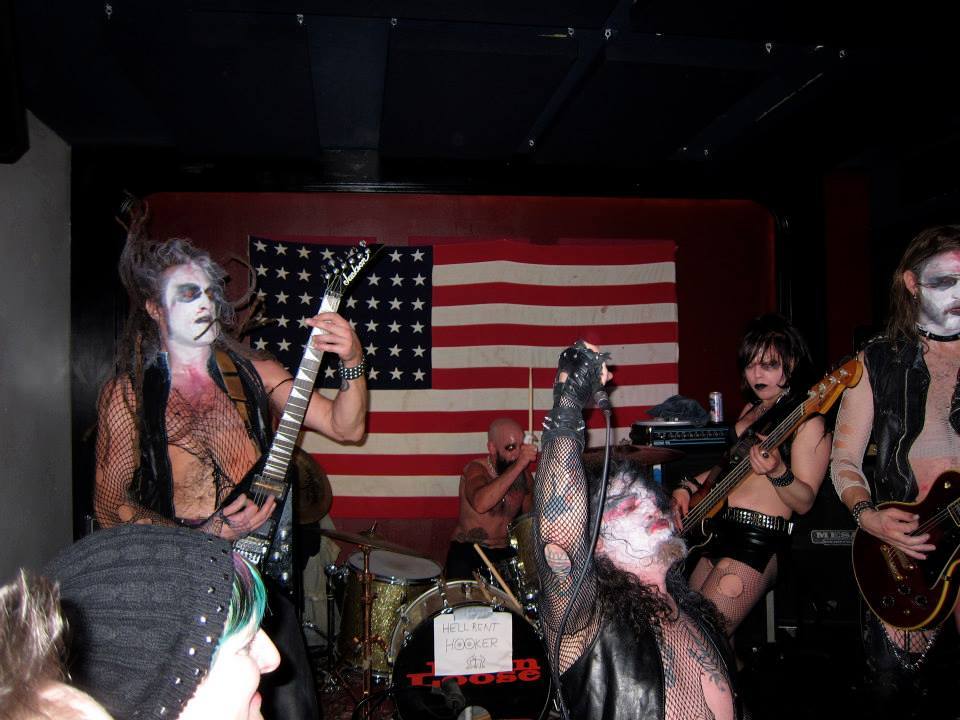
You might not know it, but Cuba has a storied history of heavy metal bands with names like Combat Noise, -Eskoria-, and Zeus. If Brooklyn artist Duke Riley has his way, New York’s Hellbent Hooker will soon make a guest appearance on the scene as part of his project for the upcoming 12th Havana Biennial.
The group-curated biennial opens May 22 and features artists hailing from nations ranging from Afghanistan to Venezuela, with more than two dozen Cuban participants. Among the marquee names included are Daniel Buren, Anish Kapoor, Joseph Kosuth, and Tino Sehgal.
“Hellbent Hooker’s singer actually used to be a hockey player, so if I get them there, they’ll play on skates,” Riley promised in a recent phone chat.
But Riley needs to raise about five grand to cover expenses. You can pitch in by attending a benefit performance by the band this weekend in Brooklyn, at artist Jonathan Schipper’s Greenpoint studio. “We’ll charge maybe $10 at the door, which will cover food,” he said. “We’re going to have a pig roast and maybe a clambake. There’ll be some sort of auction, as well as band paraphernalia like T-shirts for sale.” (Watch Hellbent Hooker’s Facebook page, linked to above, for information.)
The US is gradually making nice with Cuba after years of alienation, and Riley’s project could be read as a tongue-in-cheek offering in that spirit.
Notably, that warming of diplomatic relations has been slowed by Cuba’s arrest of activist artist Tania Bruguera after an aborted performance about free speech (see How Tania Bruguera’s Whisper Became the Performance Heard Round the World). Artists and other cultural figures have taken up Bruguera’s cause (see Artists Demand Freedom for Cuban Artist Tania Bruguera in Times Square), and one art historian has boycotted the biennial (see Art Historian Gustavo Buntinx Boycotts Havana Biennial Over Ludicrous Charges Against Tania Bruguera).
Funny enough, Riley could be said to be (pun alert!) throwing ice on the thaw.
“I’m building a hockey rink on the Malecon, which will be up for the whole summer,” the artist said, referring to the broad, beachfront esplanade. During the opening festivities, there will be hockey games and ice disco, with more hockey games to follow throughout the run of the show.
“But it dawned on me late in the game that something was missing and it was Hellbent Hooker,” Riley said. “I’d had a rash of sobriety but I had a moment of clarity after a few beers.”
Riley is known for boozy events, including illegal nighttime barbecues on remote city beaches. The artist, who also runs a tattoo parlor, is an avid scofflaw. He launched a homemade submarine into the East River as an art project in 2007, getting himself arrested. The New York Post dubbed him a “sub moron.”
Perhaps Riley’s best-known event is a mock naval battle he staged in 2009 in Flushing Meadows-Corona Park, near the Queens Museum of Art. That performance involved five reed boats, each representing a cultural institution from one of New York’s boroughs, doing combat in a shallow pool.
The Havana project was partly inspired by materials scavenged while Riley was in residence that summer, building his boats at a disused Queens skating rink that was to be razed to make way for the museum’s recent expansion. The museum invited him to take what he liked, and he snagged rink signage and hundreds of pairs of skates.
“We’ve got ‘em in all sizes, from toddler to Sasquatch,” the artist said.
Duke Riley’s Saint Patrick’s Day parade in Havana.
Photo: Kitty Joe Saint Marie.
Riley has taken part in the Havana show before. In 2009, he staged a “San Patricio Parade” there in honor of a history of Irish immigration to Cuba. It was led by Farah, whom Riley describes as “the legendary drag queen of O’Reilly Street,” a thoroughfare named for a Dublin-born general who married into a Cuban family.
The new project is similarly based in unlikely nuggets from the historical record, says the artist.
“Part of the reason I decided to do this project is that there’s a long pre-revolutionary history of attempts to introduce ice skating and hockey to Cuba,” Riley said. “They’ve all pretty much failed. At one point there was a professional team but they didn’t even make it for a full season before they folded. An arena once opened but pretty soon they turned it into a shopping mall. Sonja Henie, a famous Norwegian figure skater, performed there in the ’50s and tried to start a figure-skating show and that failed.”
The project has a subtle political edge, Riley added.
“With the US and Cuba re-opening their relationship, there’s going to be various forms of cultural exchange,” he said. “Some of those will have tremendous impact and others will be short-lived. This is a celebration of the latter.”